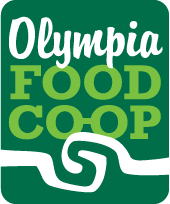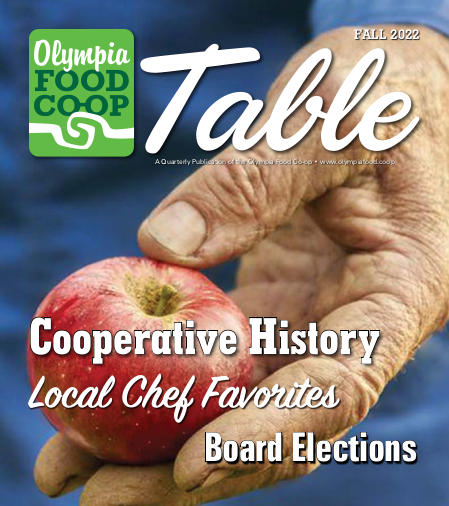The Olympia Food Co-op Is 45 This Year!
The purpose of the Olympia Food Co-op is to contribute to the health and well being of people by providing wholesome foods and other goods and services, accessible to all, through a locally oriented, collectively managed, not-for-profit cooperative organization that relies on consensus decision making. We strive to make human effects on the earth and its inhabitants positive and renewing, and to encourage economic and social justice.
Like many food co-ops across the country, the Olympia Food Co-op began as several food buying clubs combined to share resources and space. Food buying clubs were being started throughout the nation in the 1970s by people seeking healthier food options, at that time whole grains and organic produce were hard to find, and to save money through cooperative bulk buying. The original name was the Fourteen Ounce Okie Dokie Buying Club and the first location was a store front on 4th Ave. The Olympia Food Co-op was incorporated in March of 1977 and moved to our Westside location in 1980.
Our Co-op model is based on a set of cooperative principles established in 1844 by the Rochdale Equitable Pioneers Society, a group of artisans working in the cotton mills in Rochdale, England. The weavers faced miserable working conditions and low wages, and they could not afford the high prices of food and household goods. They decided that by pooling their scarce resources and working together they could access basic goods at a lower price. They also decided it was time shoppers were treated with honesty, openness and respect, that they should be able to share in the profits that their custom contributed to and that they should have a democratic right to have a say in the business. Every customer of the shop became a member and so had a true stake in the business. https://www.ica.coop/en/rochdale-pioneers
The Rochdale Principles include voluntary and open membership, democratic member control and economic participation, autonomy, education, training and information, cooperation, and concern for the community. https://cultivate.coop/wiki/Rochdale_Principles
Because they are driven by values, not profit, cooperatives work together to build a better world through cooperation, fairness, equality and social justice. Because they are owned by the community, not shareholders, the economic and social benefits of cooperatives stay within their communities. Profits are reinvested into the business or shared with the community. https://www.ica.coop/en/cooperatives/what-is-a-cooperative
The Olympia Food Co-op shares profits through community donations and sponsorships and our Co-op Access Program, which provides free memberships to low-income community members with a 10% discount at the register.
Since our inception, the Olympia Food Co-op has had a whole-systems, values driven approach. Our business is owned by our members, governed by a Board of Directors elected by our members, and run by a staff collective. We are one of a handful of food co-ops left in the U.S. that has remained committed to non-hierarchal, consensus-based governance. But doesn’t consensus take so much time? Isn’t it impossible to reach a decision? Wouldn’t it be easier just to vote? These are popular myths spread throughout hierarchical cultures.
Consensus decision making is a creative and dynamic way of reaching agreement. Instead of simply voting and having the majority of the group get their way, groups using consensus are committed to finding solutions that everyone actively supports, or at least can live with. This ensures that all opinions, ideas and concerns are taken into account. Through listening closely to each other, no decision is made against the will of an individual or a minority. If significant concerns remain unresolved, a proposal can be blocked and prevented from going ahead. This means that the whole group has to work hard at finding solutions that address everyone’s concerns rather than ignoring or overruling minority opinions. Consensus is used widely by people around the world working towards a more just and equitable society.
Many of us experience very little control over our lives in the wider world, with decisions being made for us by managers, benefits agencies, the police, politicians. We’re encouraged to compete with each other and scapegoat whoever is beneath us, instead of questioning why there isn’t enough to go round in the first place. Using consensus gives us a taste of how things could be done differently. It aims to dismantle all kind of hierarchy, and replace it with shared power. It is based on the values of equality, freedom, co-operation and respect for everyone’s needs.Consensus is neither compromise nor unanimity – it aims to go further by weaving together everyone’s best ideas and key concerns – a process that often results in surprising and creative solutions.
When everyone agrees with a decision, they are much more likely to implement it. People are more likely to stay involved in a group that is committed to hearing their views and meeting their needs. Many of the people struggling for social justice have recognized that changing the way we make decisions is key to achieving equality and freedom. A just society is one that manages to balance the needs and desires of every individual with those of the closer community and the wider world. These are precisely the aims of consensus. https://www.seedsforchange.org.uk/consensus
Inclusive and equitable non-hierarchical consensus-based decision-making governance has been practiced on this earth since time immemorial. For example, in what is now the United States, five nations – the Cayuga, Mohawk, Oneida, Onondaga, and Seneca – formed the Haudenosaunee Confederation, which still works on a consensual basis today. Consensus decision-making models are used by a diversity of people, “Consensus is rooted in many decentralized models of direct democracy practiced across the world — from village panchayats in India to the indigenous Haudenosaunee Confederacy (aka Iroquois), from Quaker meetings to anarchist spokescouncils.
There is a problem with consensus that is more fundamental and structural. Ironically, the seemingly benign notion that all voices are equal can hide the uncomfortable truth of systemic inequality. Almost inherently, the consensus process can absolve us of actively examining how privilege and oppression shape our spaces. Boyd, A., & Mitchell, D. O. (2016). Beautiful trouble: A toolbox for revolution. OR Books
In an effort to address these problems, many communities and collectives use modified forms of consensus — for example, prioritizing and taking leadership from women, people of color, and those directly affected by the decisions being made, facilitating small break-out groups to ensure more engaged participation; encouraging more debate and discussion rather than just asking for blocks; and actively incorporating anti-oppression principles to prevent harmful opinions from further marginalizing historically disadvantaged peoples. https://beautifultrouble.org/toolbox/tool/consensus-is-a-means-not-an-end/
Among the Olympia Food Co-op’s stated goals are: make good food accessible to more people and support local production. Our focus is on natural, whole and organic foods and our staff collective has agreed to product selection guidelines to support purchasing decisions. We ask questions like,
How are the farmworkers who harvested this produce being treated? How does this company treat its workers? Does this product packaging have a negative environmental impact, false or misleading nutritional, environmental, or ingredient claims, or exploitative/oppressive imagery? Is the culture represented by this product benefitting from its sales? Can we get this product from a local grower/producer?
There are reasons why we have the freshest produce in town, why our deli food is so delicious. You are often buying and eating food picked and brought in that very day by a local farmer. When we choose locally sourced food, we support an alternative economy that sits outside the mainstream food systems, systems that often focus more on marketing spin than nutrients. Our money benefits local artisans, not giant corporations with questionable ethics, and it stays local. We get what we actually need, and support people who are directly stewarding our landscapes and benefiting our watersheds and catchments. Our weekly grocery shopping becomes a tool for increasing local resilience. https://www.milkwood.net/2017/05/15/food-co-ops-collectives-3-examples-of-community-food-systems/
And then there’s the community aspect, our working member program, our part time flex staff, our stores where you run into neighbors, old friends, have conversations, bring in a stack of shopping bags for re-use, pick up something cool from the free store, share recipe ideas with your cashier, grab snacks for your road trip. The Olympia Food Co-op exemplifies connections, transparency, and good food everywhere we look.

